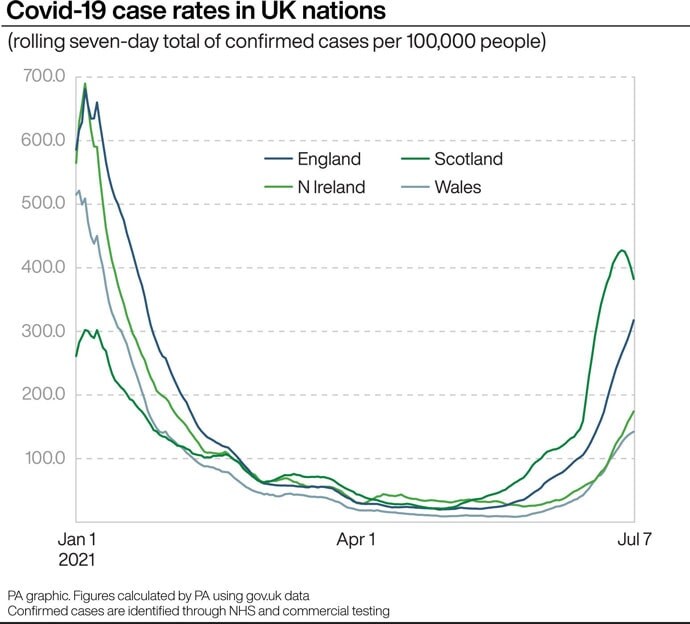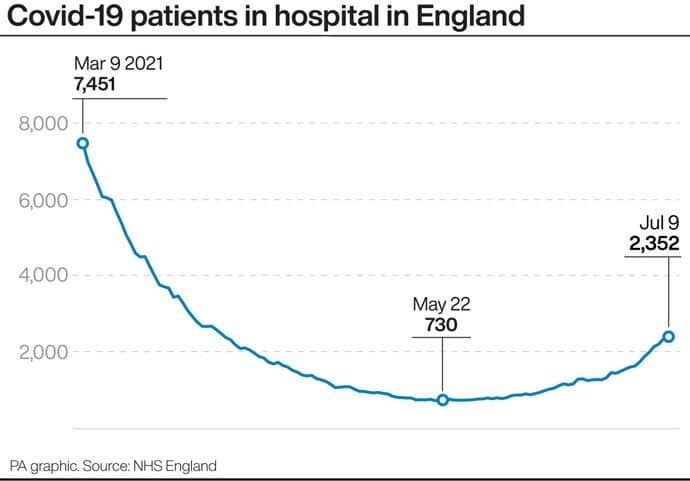Editor's note, 12 July 2021: This article was updated with new information from the Commons, a Downing Street briefing, and additional comments.
These are the UK coronavirus stories you need to know about today.
England's Unlocking Going Ahead
England's Health Secretary Sajid Javid told the Commons plans to remove COVID-19 restrictions in England will go ahead next week.
He said delaying removing lockdown measures by 4 weeks allowed for seven million extra vaccine doses to be delivered.
"We've pledged that by 19 July that we would have offered every adult a first dose of the vaccine, and have given two doses to two thirds of all adults. And I'm pleased to inform the House today that we're on track to beat both of these targets."
He cited Public Health England estimates that "the vaccination programme in England has prevented between 7.5 million and 8.9 million infections, it’s prevented some 46,000 hospitalisations, and around 30,000 people losing their lives."
He continued: "Sadly, the case numbers will get a lot worse before they get better. We could reach 100,000 cases a day later in the summer. Hospitalisations are also rising with sustained growth over the past month."
However, Mr Javid said: "We do not believe that infection rates will put unsustainable pressure on the NHS."
He said the tests for unlocking had been met, "And we firmly believe that this is the right time to get our nation closer to normal life. So we will move to the next stage of our roadmap on July 19."
He urged caution: "Everyone should return to work gradually if they're currently working from home, they should try to meet people outside where that's possible, and it is expected and recommended that people should wear face coverings, unless they're exempt, in crowded indoor settings like public transport."
He said: "We'll be working with clinicians and the NHS to explore what more can be done for colleagues in patient facing roles. This would only be used in exceptional circumstances where the self isolation of fully vaccinated close contacts could directly impact the safety of patients so that we can keep our vital services going as we safely and gradually get... closer to normal life."
The Health Secretary did concede that plans could change: "If that risk matrix changes, for example with variants of concern, we will not hesitate to take the appropriate action."
'Pandemic is Not Over'
"I cannot say this powerfully or emphatically enough, this pandemic is not over," Prime Minister Boris Johnson told a Downing Street briefing later.
Mr Johnson was no longer using the term "irreversible" in relation to his roadmap but said: "Of course I hope that the roadmap is irreversible." However, if a new variant "is causing us a real problem" he said "we will not hesitate to use the means that we have at our disposal".
Chief Medical Adviser Professor Chris Whitty gave an update on the latest figures and said: "Modelling data, and other data would imply that if we go slowly with the next stage of the roadmap, the expectation is this will not reach the point where it is putting unsustainable pressure on the NHS."
Going slowly through the next step was "essential" to reduce the impact of the "exit wave", he said.
Later Prof Whitty added: "To think that we're not going to have any pressure on the NHS is not fully realistic."
Rising Cases
Sunday's daily data show 31,772 people testing positive for COVID-19, 26 deaths within 28 days of a positive test, and 563 COVID-19 patients admitted to hospital.
The latest Office for National Statistics infection survey estimated that 1 in 160 people in England had COVID-19 in the week to 3 July.


On Friday, the Academy of Medical Royal Colleges issued a statement saying: "There is little doubt that things will get worse before they get better."
It said a time will come when this "dangerous and erratic disease is largely under control".
"However, we are not in that position yet and sadly, we have to expect things to get worse again."
Last week, more than 100 scientists and doctors signed a letter to The Lancet warning that removing restrictions would be a "dangerous and unethical experiment".
Commenting on today's announcement, the Chief Executive of NHS Providers, Chris Hopson said: "The NHS will need to treat increasing numbers of COVID-19 patients in hospital at a time when the service is going full pelt to recover backlogs, is seeing record emergency care demand for this time of year, is losing significant numbers of staff to self-isolation and has much reduced capacity due to infection control.
"This will inevitably mean the NHS will be unable to recover care backlogs as fast as trusts, and patients, would like and ministers should be clear about this trade off. In this context, predictions of at least 1000 COVID-19 admissions a day from the Scientific Advisory Group for Emergencies are concerning.
"We also need to be aware of the other risks here – that the vaccines do not offer 100% protection and that there are still significant numbers of people who haven’t had their double jab and 2-week protection build-up. Trust leaders are also concerned about the impact of long COVID, not least because there is so much we do not yet understand about the extent and severity of its impact."
Wales' forthcoming Coronavirus Control Plan for a future date when it lifts restrictions says face coverings will continue to be required on public transport, and in health and social care settings. "Although we have weakened the link between the virus and serious illnesses...we haven't broken it completely," Wales' CMO Dr Frank Atherton told a news conference today.
"So we do need to continue to proceed with caution."
There'll be an announcement tomorrow about Scotland's lockdown.
Northern Ireland hasn't set an end date for coronavirus restrictions.
NHS Staffing Pressures Mounting
A Royal College of Emergency Medicine workforce survey found that 3 in 5 Emergency Medicine staff have experienced high levels of burnout, stress, and exhaustion.
The RCEM is calling for UK governments to take action to ensure safe staffing levels.
President, Dr Katherine Henderson, said: "The workforce survey reveals the scale of the problem in the Emergency Medicine specialty with burnout and retention of staff. The fact that half of Emergency Medicine staff are considering reducing their hours in the near future and over one quarter are considering taking a career break, is deeply worrying."
Separately, the BMA said England has 2.8 doctors per 1000 people, lower than the European average of 3.7.
Dr Latifa Patel, acting chair of the BMA representative body and chief officer workforce lead, said: "It’s frightening that we’ve reached a point where we’re short of 49,162 full-time equivalent doctors, but even more terrifying to think that this number could hit 83,779 by 2043, as our research suggests. If this crisis is left to deepen, more patients will go without the care they need, their safety will be threatened, and existing staff will be pushed to the limit like never before, driving yet more talented healthcare professionals out of the NHS."
Jabs, Myocarditis, and Pericarditis
The MHRA said it had undertaken a thorough review of UK and international reports of cases, and there is an "extremely rare" risk of myocarditis and pericarditis following COVID-19 vaccination.
As of 30 June, there were:
- 74 reports of myocarditis and 50 reports of pericarditis following use of the Pfizer/BioNTech vaccine, one report each of viral pericarditis, infective pericarditis and Streptococcal endocarditis
- There have been 60 reports of myocarditis and 98 reports of pericarditis following Oxford/AstraZeneca vaccination, and four reports for viral pericarditis and endocarditis, two reports of endocarditis bacterial, and one report of viral myocarditis
- There have been seven reports of myocarditis, six reports of pericarditis, and one report of endocarditis following Moderna vaccination
The MHRA said it will "continue to closely monitor cases of myocarditis and pericarditis with all of the currently authorised COVID-19 vaccines.
"It is important that anyone who experiences new onset of symptoms such as chest pain, shortness of breath or feelings of having a fast-beating, fluttering, or pounding heart seeks medical attention."
Double Variant Infection
The European Congress of Clinical Microbiology & Infectious Diseases (ECCMID) was told about the death of a 90-year-old unvaccinated Belgian woman who was simultaneously infected with the Alpha (UK) and Beta (South African) COVID variants.
Lead author, Dr Anne Vankeerberghen, said: "Whether the co-infection of the two variants of concern played a role in the fast deterioration of the patient is difficult to say.
"Up to now, there have been no other published cases. However, the global occurrence of this phenomenon is probably underestimated due to limited testing for variants of concern and the lack of a simple way to identify co-infections with whole genome sequencing."
Commenting via the Science Media Centre, Professor Lawrence Young, virologist and professor of molecular oncology, University of Warwick, said: "Detecting two dominant variants of concern (VOCs) in a single person is not a surprise – these could have been passed on by a single infected individual or by contact with multiple infected people. There is no evidence that this infection with two VOCs was in any way responsible for the clinical outcome in this case.
"This study does highlight the need for more studies to determine whether infection with multiple VOC affects the clinical course of COVID-19 and whether this in any way compromises the efficacy of vaccination.”
Reinfection
Public Health England's latest technical briefing gave details of SIREN study monitoring of 44,546 NHS workers for reinfection. It said: "The frequency of PCR positivity in the
SIREN cohort overall has increased in June, after very low levels March-May.
"Of the 77 participants with a PCR positive sample since April 2021 in the SIREN cohort overall, 66 (81%) occurred 14 days or more following their second vaccine dose. Reinfections remain at very low numbers in individuals previously either PCR positive or seropositive."
Azithromycin
The ECCMID conference also heard about Oxford University research which found azithromycin does not prevent mild COVID-19 cases progressing to hospitalisation or death.
The study was published in The Lancet. The authors wrote: "In this trial of people with clinically-diagnosed mild-moderate COVID-19 managed without hospital admission, adding azithromycin to standard care treatment did not reduce the risk of subsequent hospitalisation or death, or of time to hospitalisation. This finding, taken together with clear negative results from other studies across the disease course from early, low risk patients, to severe hospitalised disease, provides strong confirmation that azithromycin is not effective in treating COVID-19.
"It is essential that clinicians worldwide stop using this medication as a treatment for COVID-19. We now know it is not effective against COVID-19 and we need urgently to protect against the very real threat of driving drug resistance to this precious class of antibiotics."
'Autoantibodies'
An unpublished Imperial pilot blood test study points to rogue 'autoantibodies' being behind the risk of people developing long COVID.
Lead author, Professor Danny Altmann, told the BBC the findings are "a very exciting advancement".
Graphics credit: PA Media
See more global coronavirus updates in Medscape’s Coronavirus Resource Centre.




